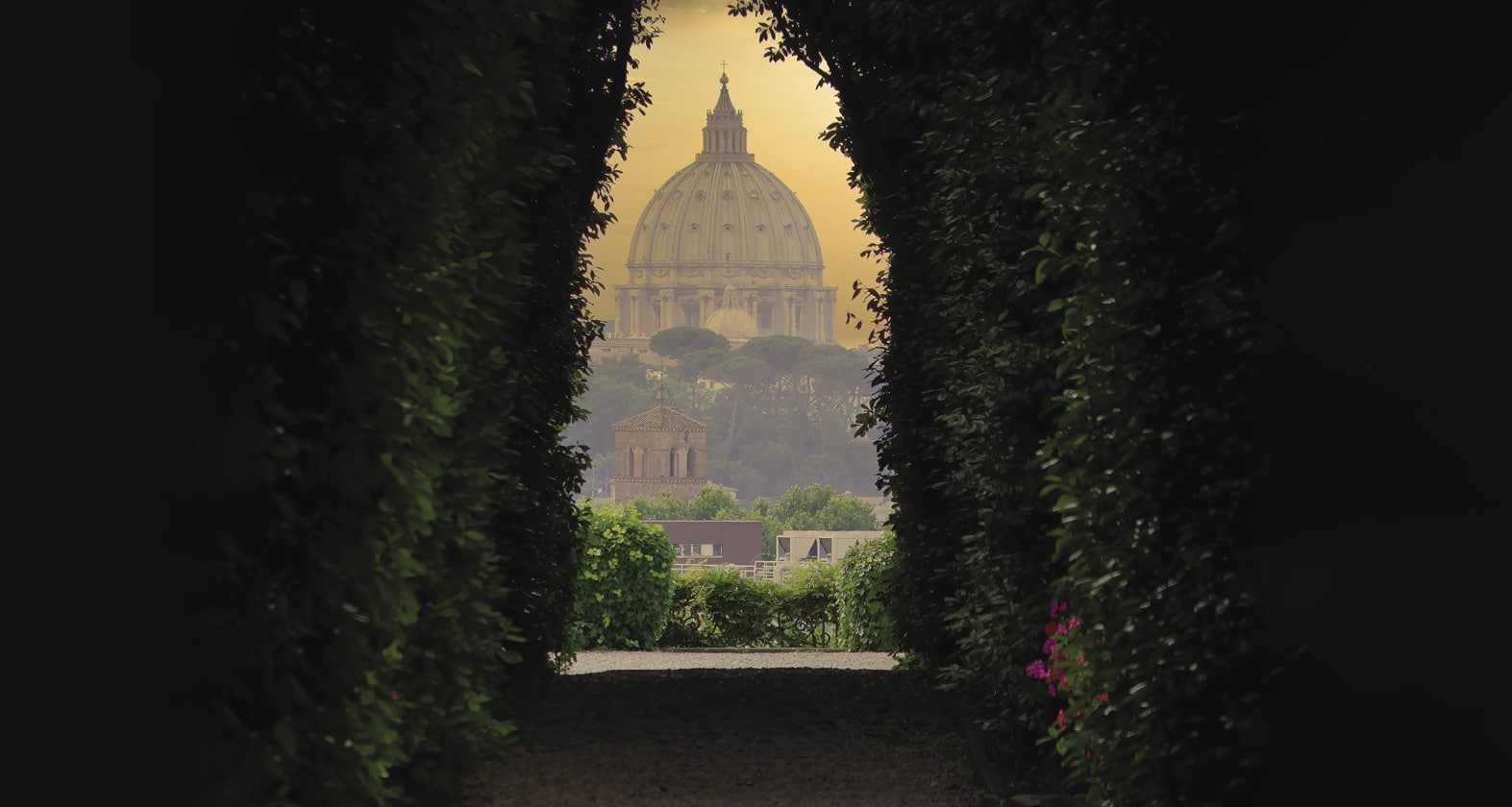An exploration of the Catholic Church’s social teaching can guide our approach to living out the Gospel.
Many people feel and confused by Catholic social teaching. The irony is that this is not because the Church keeps its social justice tradition a secret, but because we are often unable to perceive it. We look for it not through the lens of the Church’s teaching, but through the lens of human traditions. In short, we tend to evaluate the Church’s tradition in light of our politics and culture instead of evaluating our politics and culture in light of the Church’s teaching.
In this article, I want to sketch out the basics of the Church’s social teaching and urge us to experiment with looking at the world through it rather than through the lens of our politics.
Four Pillars
Picture the Church’s social doctrine as a throne founded on four pillars: the dignity of the human person, the common good, subsidiarity, and solidarity. Seated on that throne is any person you will ever meet. Just as a chair requires that each leg be of equal length and strength, so the four pillars of Catholic social teaching are equally important. They exist in harmony in the mind of the Church and must not be set in competition with one another.
The Dignity of the Human Person
The first principle of Catholic social teaching flows from two basic facts revealed in Scripture: a) human beings are made in the image and likeness of God; and b) Jesus Christ was crucified and raised for the salvation of every human being without any exception whatsoever. The implications can be summarized this way: Human beings, made in the image and likeness of God, are sacred from conception to natural death and intended for eternal happiness with God.
Because of this, persons are due honor not because of their income bracket, looks, skin color, ancestry, intelligence, mental health, physical condition, age, citizenship, religion or lack thereof, sexual orientation, gender, or anything they do or don’t do. They possess dignity for one reason only: because they are made in the image and likeness of God. And it makes not one ounce of difference if that person believes in God or not: They retain that dignity because of who they are.
Since our dignity does not proceed from anything we do, it cannot be taken from us by anything we do either. Because our dignity owes to the fact that we alone in creation are made in the image and likeness of God, it follows that the Church was simply right when it articulated the 20th century’s single most shocking doctrine (a development its members have barely begun to grasp): Man is “the only creature on earth which God willed for itself” (“Gaudium et Spes,” 24).
This means that no human being is a means to an end. No human being’s good can be subordinated to some human system. Therefore, all systems—political, military, economic, scientific, religious, philosophical, and ecclesial—are made for the human person, not the other way around.
The problem we face is that, as G.K. Chesterton said, “Men do not differ much about what things they will call evils; they differ enormously about what evils they will call excusable.” As a result, enormous pressure is placed on Catholics to find different classes of human beings who can be thrown away in the service of some political, social, or economic system.

In some circles, the pressure is to regard the unborn, sick, or elderly as disposable. In others, it is to see the brown, the poor, the refugee that way. And very commonly, those who favor one group weaponize their preferred form of human life against another.
As an example, a prominent figure in a well-known apologetics apostolate responded to the 2022 massacre of small children in Uvalde, Texas, by tweeting (within just a few hours of the slaughter): “Is gun violence a pro-life issue? My answer is ‘No.’” For those who see through the American political lens, abortion is a conservative issue while gun violence is liberal. For those who think with the Church, things that kill people are assaults on human life.
That’s why there are so many other things the Church insists (in “Evangelium Vitae”) are also pro-life issues: war, torture, bodily mutilation, coercion of free will, violence, murder, arbitrary imprisonment, mistreatment of the environment, capital punishment, deportation, disease and lack of health care, drug abuse, hunger, poor working conditions, poverty, slavery, subhuman living conditions, suicide, euthanasia, prostitution, artificial contraception and responsible procreation, sexual abuse, sexual promiscuity, and sterilization. It is fine if a person wants to focus on defending the unborn as, say, Dominicans focus on preaching or Benedictines focus on contemplation. The problem comes when we pit the unborn against all the forms of human life threatened by these other evils and declare that those other lives don’t matter. They do.
And because, as the saying goes, “All Lives Matter,” it follows that the dignity of the human person leads inexorably to the second pillar of Catholic social teaching.
The Common Good
The basic idea of the common good is that because each person is made in the image and likeness of God, therefore all persons are. That means that we are to be more pro-life, not less.
Two useful images for getting at the basic concept of the common good are Abraham (from the Old Testament) and the concept of the body of Christ (1 Cor 12:12).
Abraham is chosen by God, significantly, so that “Through you shall all the nations be blessed” (Gal 3:8). The “nations” refers to the gentiles: all those peoples all over the world who are not chosen. In other words, a foundational biblical concept is that the chosen are chosen for the sake of the unchosen. That idea is brought to its most profound consummation when Paul tells us that Jesus, the chosen one, “became poor although he was rich, so that by his poverty you might become rich” (2 Cor 8:9). So he calls us to imitate Jesus by viewing everything we have as a gift and by recalling that every gift we have, material as well as spiritual, is to be regarded as entrusted to us for the good of somebody else.
Jesus’ teaching on this score is shocking and radical. He urges us not only to “give to the one who asks of you” (Mt 5:42) but also to make certain that they cannot repay you (Lk 14:12–14). Jesus repeatedly offers us a view of our possessions as only valuable if their use is directed toward other people who need it more than we do. As St. John Chrysostom puts it, “The rich exist for the sake of the poor. The poor exist for the salvation of the rich.”
This means that the common good is far more commonly a matter of justice than charity. Justice means giving people their due. If I hand you 10 bucks I don’t owe you, that’s charity. If I walk past you as you are bleeding on the sidewalk, I don’t sin against charity, but against justice as the priest and the Levite did in the parable of the good Samaritan. That is why the state exists: to do justice, not charity. Because you are owed your life. It is justice, not charity, to see that people have things like food, water, shelter, health care, and education. That is why taxes are not theft, but the due we owe to the common good.
The primal school of the common good is the family, and a lot of Catholic social teaching can be summarized as, “If it’s good for the family, it’s good.” Though the family is the basic building block of society, the Gospel adds one crucial point: Building blocks are for building. So Jesus insists that the family is subordinate to the kingdom of God, and the Gospel (and experience) warns of what happens when we put blood, kin, race, and nation ahead of the demands of the Gospel.
Subsidiarity
In order for the common good to be served, it is vital that each human being become personally involved in being sacraments of God’s grace and provision to our neighbor. That is where the principle of subsidiarity comes in.
Subsidiarity means that the people closest to a problem or need should address it, and we only go up the ladder of power and authority a step at a time when they can’t or won’t. Most children are housed, most naked people clothed, most students taught, most bellies filled, and most neighborhoods kept in good order by ordinary people going to work, caring for their families, and doing the ordinary things people do.
So if you need bread, you don’t phone the White House and ask the 101st Airborne to airlift you a loaf. You make it or buy it yourself.
But suppose the grocer says, “We don’t serve your kind here.” At that point, you move up the ladder of authority and phone the cops to say you are being denied your constitutional right to shop. Usually that does the job. But suppose the cops side with the bigots as they sometimes did during the struggles of the early ’60s? Then you go higher still, as high as it takes. In the ’60s, that meant passage of the Civil Rights Act at the federal level.
The point is that we are to try to keep participation in the love of neighbor in as many local hands as possible, so that we can all participate in the work and not just write a check to some faceless bureaucracy. But there are indeed some matters that require responses from higher and more powerful authorities.
Indeed, the current and previous two popes (shockingly to many Americans) have noted that there are some matters that require a “true world political authority” to address. So, for instance, as global pandemics, climate change, and superpower threats to peace proliferate, the Church would regard global responses not as a violation, but as a fulfillment of the very same principle of subsidiarity, which holds that you, and not some remote bureaucrat, are the one responsible to make your kid his peanut butter sandwich.
The sole exception here is in the use of violence. Subsidiarity very much wants you and me to take responsibility to deliver mac and cheese to our sick neighbor and to do our part to help our local community. But it absolutely forbids us to hold our neighbor prisoner in our closet or inflict the death penalty on him because we decided he has it coming. This is restricted to the state and the bigger the act of violence, the higher up the ladder we go. That is why the mayor of Seattle can’t declare war on the city of London. War is declared by nation-states and, if the Church had its way, it would be declared only by the United Nations. Because violence tends to destroy the last principle of Catholic social teaching: solidarity.
Solidarity
Solidarity means we are all in this together, and none of us can say, “Your end of the Titanic is sinking.”
As St. John Paul II puts it, solidarity “is not a feeling of vague compassion or shallow distress at the misfortunes of so many people both near and far. On the contrary, it is a firm and persevering determination to commit oneself to the common good; that is to say, to the good of all and of each individual, because we are all really responsible for all.”
As with all Catholic social teaching, solidarity has deep biblical roots in both the Old and New Testaments. The author of the Acts of the Apostles summarizes those roots nicely when he says that God “made from one the whole human race to dwell on the entire surface of the earth, and he fixed the ordered seasons and the boundaries of their regions, so that people might seek God, even perhaps grope for him and find him, though indeed he is not far from any one of us” (Acts 17:26–27).
There is only one race—the human race—in the biblical view. Nobody is a lesser species, and each is connected to all. And that connection is only deepened by the grace of Baptism, which extends our solidarity into eternity with the truth that “There is neither Jew nor Greek, there is neither slave nor free person, there is not male and female; for you are all one in Christ Jesus” (Gal 3:28).

A number of things spring from this. For instance, as Pope Francis points out in “Laudato Si’,” the crisis surrounding the dignity of the least of these—whether the unborn or the poor—is the same as the crisis surrounding the destruction of the environment because the earth is “our common home.” What happens to creation inevitably affects what happens to us. Poisoned air suffocates us. Polluted water makes us sick. And the destruction caused by climate change affects all of us.
In addition, our solidarity with one another is both global and intergenerational. The global nature of solidarity is experienced by millions every day on the Internet, but also through international commerce—and international spread of pandemic. Its intergenerational nature is reflected in the immense debt we owe our ancestors and in the equally immense debt we owe our children to pay it forward by doing what we can to leave the world better than we found it.
Another implication of solidarity is our obligation to challenge and reform “structures of sin.” An example of this is found in Acts 19:23–40. When Paul went to Ephesus to preach the Gospel, he did not simply threaten a religious system that worshipped Diana, the moon goddess. He threatened an entire socioeconomic and political system organized around her temple, one of the seven wonders of the world.
Consequently, it was not just a gaggle of random members of the cult of Diana that attacked him. It was a mob organized and spurred on by the silversmiths of Ephesus, who made their living selling Diana trinkets to pilgrims. The Gospel threatened (and in good time would eventually dismantle) a religious-economic-sociopolitical structure of sin in Ephesus that stood opposed to the kingdom of God. The analogy of this to such modern ills as gun violence, human trafficking, or our abortion regime is not hard to see.
The point of the four pillars is to draw on the fullness of the Church’s tradition and to be formed to live that tradition harmoniously, not in conflict and competition. It is possible to do this with the help of the Holy Spirit, the grace of the sacraments, and the guidance of the magisterium. Let us move forward as the body of Christ with minds and hearts formed by Christ and not the traditions of humanity, so that we can help sanctify ourselves and our neighbors and renew the face of the earth.









5 thoughts on “The Church’s Best-Kept Secret ”
Thank you, Mark, for your clear explanation of the pillars of Catholic social teaching in the modern world. Although at times uncomfortable, it is critical that we know and begin to live these principles inherent to the Scriptures, to the Gospel, to Jesus, to Church teaching, and to Catholic Tradition.
I don’t believe God’s plan was a free ride for everyone. We are not entitled to a job but should be given a fair shot at one with a fair wage for the value that we add. Look at China, Russia, Venezuela…. How is socialism working out?
I’m sorry, artificial contraception AND “responsible procreation”? I though the Church allowed for NFP. And one day they might have to square irresponsible parenting with climate change and poverty. Otherwise, great article.
This article opens up another area where the church needs to do penance, at least in Cincinnati. Despite the social encyclicals supporting of workers to organize labor unions and negotiate with employers for wages and working conditions, the Archdiocese of Cincinnati, when faced with ALTA (Archdiocesan Lay Teachers’ Association) in the late 1960’s and early 1970’s refused to meet with ALTA and actually managed totally destroy it. Unions are OK, I guess, as long as they do not confront the church. Also in this time frame, parishes paid less than living wages to their janitors, cooks and housekeepers. Also, housekeepers were associated with particular pastors. If a pastor died or was moved, little consideration was given to the housekeeper, although some went with the pastor to his new assignment. In addition to the problematic way the church dealt with priest predators, their treatment of other employees left major questions about the church’s dedication to social justice.
This article is an excellent supplement to what I’m teaching on Catholic Social Teaching and Laudato Si’ in our parish RCIA program. As the U.S. Catholic Church grows increasingly conservative, it’s getting more and more difficult to teach about Catholic Social Teaching.